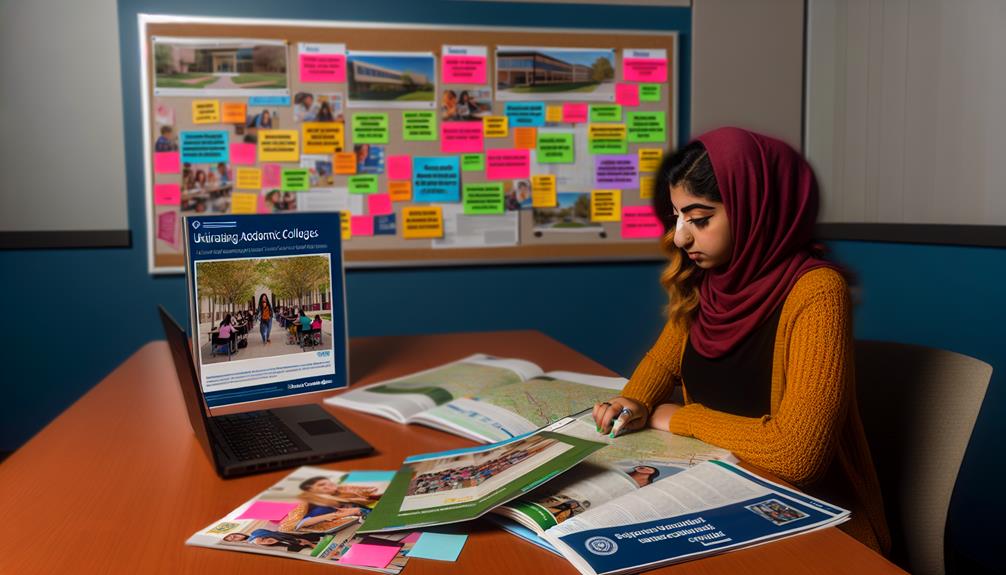To choose the best community college in the USA, start by evaluating your academic goals and preferred programs. Look for colleges that match your interests and offer accredited degrees. Examine graduation and transfer rates to gauge the college's success in supporting students. Don't forget to take into account financial aspects, like tuition costs and available aid. Explore student support services to guarantee you have the help you need. Attend open house events to get a feel for the campus environment. You'll find useful insights that can guide your decision-making process as you explore your options further.
Key Takeaways
- Assess your academic goals and ensure the college offers relevant programs and transfer options to align with your aspirations.
- Evaluate graduation and transfer rates, focusing on colleges with strong student support services and high engagement levels.
- Investigate financial aspects, including tuition costs, financial aid availability, and local in-district rates to reduce expenses.
- Check accreditation status to ensure quality education and credit transferability, which impacts job prospects post-graduation.
- Review student support services available, such as academic advising, career services, and tutoring, to enhance your college experience.
Assess Your Academic Goals
When choosing the best community college for your needs, the first step is to evaluate your academic goals. Start by determining your degree or certification objectives. Community colleges offer a variety of programs tailored to different career fields, so aligning your studies with your long-term aspirations is essential.
As you refine your academic choices, consider your personal interests and strengths. This alignment not only enhances your educational experience but also guarantees you stay motivated throughout your studies. It's also wise to review job market trends in your desired field to identify which programs can equip you with the necessary skills for future employment opportunities.
Additionally, think about transfer options to four-year institutions. Many community colleges have partnerships that facilitate a smooth changeover, making it easier for you to continue your education later on. Finally, evaluate the types of learning environments that suit your learning style and schedule, whether that's online, in-person, or hybrid. Community colleges often provide various formats to accommodate diverse student needs, guaranteeing you find the right fit for your academic journey. By evaluating your academic goals, you'll set a strong foundation for your education.
Explore Program Offerings
After setting clear academic goals, it's time to explore the program offerings at various community colleges. Research the specific programs and majors available, as they can vary considerably by institution and region. Use resources like Learn.org to help narrow down your options based on your desired field of study and career goals.
When evaluating programs, make sure to investigate their accreditation status. Accredited programs meet industry standards, which can enhance your job prospects after graduation. Additionally, consider community colleges that have strong industry partnerships and internship opportunities. These connections can provide you with valuable real-world experience and networking opportunities that are essential for your career.
It's also wise to look into the graduation rates and transfer rates of the programs you're interested in. Higher rates can indicate effective support services and successful student outcomes, which are important as you set out on your educational journey. By carefully analyzing program offerings, you'll find a community college that aligns with your aspirations and sets you on the path to success.
Evaluate Graduation Rates

Graduation rates are vital indicators of how well a community college supports its students in completing their programs. As a prospective student, you should pay close attention to these rates, as they reveal much about student success outcomes at various institutions.
Here are three key points to take into account when evaluating graduation rates:
- Institutional Performance: Colleges like Walla Walla Community College, with a graduation rate of 50%, demonstrate effective student support services, while others, like Rockville, MD, with only 21%, may struggle.
- Engagement Opportunities: Higher graduation rates often correlate with robust student engagement and resources, which can make a significant difference in your program completion journey.
- Comparative Data Access: Use resources like College Measures.org to compare graduation rates across community colleges. This information can empower you to make informed choices.
Understanding graduation rates is essential; they reflect the college's commitment to fostering an environment that promotes student success. As you evaluate your options, prioritize colleges that not only boast impressive graduation rates but also offer strong student support services to help you thrive.
Consider Financial Aspects
Evaluating your options also means considering the financial aspects of attending community college. With tuition costs generally lower than four-year universities, community colleges provide affordable tuition, making them an attractive choice. For the 2021-22 academic year, the average cost of attendance was around $3,860 for tuition and fees, and $17,760 including living expenses.
In-district students often benefit from even lower rates, so it's worth exploring local community college campuses. Additionally, financial aid options such as federal student loans, scholarships, and grants can greatly reduce your out-of-pocket expenses.
Here's a quick comparison of costs:
| Type of Cost | Estimated Amount |
|---|---|
| Average Tuition (2021-22) | $3,860 |
| Estimated Cost per Credit | $195 – $890 |
| Savings by Transferring | 15% more weekly earnings |
| Financial Aid Availability | Varies by institution |
Research Transfer Options

When you're considering transferring to a four-year institution, researching transfer options is essential for a smooth shift. Knowing what your community college offers can make a substantial difference in your academic journey.
Here are three key aspects to focus on:
- Articulation Agreements: These agreements between community colleges and four-year schools can help guarantee your credits transfer seamlessly, so you don't lose academic progress.
- Transfer Rates: Look into the transfer rates of prospective colleges. Higher rates often signal effective academic advising and support systems that can ease your shift.
- Accreditation: Verify that your community college is regionally accredited, as this status greatly impacts the transferability of your credits to four-year institutions.
Utilize academic advising services to craft a solid transfer plan early on, making sure you meet the prerequisites for your desired program. Additionally, online resources like College Measures.org can provide valuable data on transfer rates and agreements at various community colleges. By taking these steps, you'll be well-equipped to make informed decisions about your future academic path.
Analyze Location Factors
Choosing the right community college involves more than just academics; you've got to think about location, too. Proximity to home is essential because attending a nearby college can considerably reduce your daily commuting time and transportation costs. Local colleges often offer in-district tuition rates, which can make a big difference in your budget.
If you live in an urban area, you'll likely find more options, providing greater variety in programs and resources compared to rural locations. When evaluating potential schools, consider how accessible they are. Check for public transportation availability and parking options to guarantee you can get to and from campus without hassle.
Moreover, think about community engagement and available activities. A college that fosters local involvement can enhance your overall college experience, connecting you with peers and opportunities. Engaging with the community not only builds relationships but also enriches your education.
Review Student Support Services

A supportive environment can make all the difference in your college experience, and student support services play a key role in that. When evaluating community colleges, consider the following essential services that can greatly impact your journey:
- Academic Advising: Personalized guidance guarantees you choose the right courses and stay on track to meet your educational goals, which can greatly boost graduation rates.
- Career Services: Dedicated resources help you with job placement, internships, and resume writing, making it easier to shift into the job market.
- Mental Health Resources: Access to counseling and wellness programs addresses emotional and psychological needs, fostering a healthier college experience.
Additionally, financial aid counseling is vital, as it helps you navigate funding options and scholarships, reducing financial barriers to education. With effective student support services available at 82% of community colleges in the U.S., you can find the right fit that prioritizes your success. Take the time to review what each college offers; these resources can greatly enhance your academic success and overall well-being during your educational journey.
Investigate Accreditation Status
Accreditation is vital in determining the quality of education you'll receive at a community college. It guarantees that the institution meets specific educational standards, which can greatly impact your credit transferability and job prospects after graduation. When considering a college, check if it holds accreditation from recognized regional bodies like the Higher Learning Commission or the Southern Association of Colleges and Schools.
Enrolling in a non-accredited community college can limit your access to federal financial aid and complicate the process of transferring credits to four-year institutions. This could set back your educational goals and increase your costs.
To verify a college's accreditation status, visit the institution's website or consult resources like the Council for Higher Education Accreditation. Graduating from an accredited institution is often preferred by employers, enhancing your job placement opportunities.
Take the time to investigate the accreditation of your chosen community college; it's a vital step in guaranteeing you receive a quality education that aligns with your career aspirations. Making this informed choice will pave the way for a successful future in your chosen field.
Attend Open House Events

After confirming a community college's accreditation status, it's time to explore the campus by attending open house events. These events are your chance to get a real feel for the college atmosphere and the resources available to you. You'll have the opportunity to:
- Meet faculty and current students: Engaging with them lets you ask questions about academic programs and the college experience.
- Explore campus facilities: Guided tours showcase essential areas like libraries and labs, helping you visualize your future learning environment.
- Learn about financial aid options: Understanding funding possibilities can ease your financial concerns and make attending community college more attainable.
Gather Student Feedback
When exploring community colleges, gathering student feedback can be invaluable. Current and former students offer firsthand insights into program quality and faculty effectiveness. Online reviews can help you gauge student satisfaction, highlighting strengths and weaknesses of various institutions.
Attending college fairs and open house events lets you interact directly with students, where you can ask questions and gather personal experiences about the college environment. Additionally, networking with local employers reveals the college's reputation within the industry and how well it prepares graduates for the job market.
Here's a quick comparison of feedback sources you might consider:
| Source | Type of Feedback | Benefits |
|---|---|---|
| Online Reviews | General opinions | Quick overview of student satisfaction |
| College Fairs | Personal interactions | Real-time answers to your questions |
| Social Media Platforms | Diverse opinions | Broad range of experiences |
| Employer Networking | Industry insights | Understanding job market readiness |
Frequently Asked Questions
What Is the #1 Community College in the Us?
When you ask what the #1 community college in the U.S. is, many people point to De Anza College in Cupertino, CA. It's well-regarded for its strong academic programs and supportive faculty. With a 100% acceptance rate and an average Niche rating of 3.8 stars, it reflects high student satisfaction. Plus, its net price of $8,267 makes it an affordable choice for many, ensuring you get quality education without breaking the bank.
What State Has the Best Community College System?
When you're considering which state has the best community college system, California often comes to mind. With over 114 colleges serving millions of students, it excels in student success and diverse program offerings. Texas also stands out, focusing on affordability and workforce development. Meanwhile, Florida boasts impressive graduation rates, and Washington is known for its innovative programs. Each state offers unique strengths, so think about what's most important for your educational goals.
How Do I Choose the Best College for Us?
To choose the best college for you, start by identifying your academic goals and career plans. Research programs that align with these objectives, ensuring they're accredited and well-regarded. Don't forget to evaluate costs, including tuition and fees, and explore financial aid options. Visit campuses to assess facilities and support services, and consider their location for convenience. Finally, utilize academic advising to understand transfer opportunities for your future education.
How Do I Find the Right College for Me?
To find the right college for you, start by identifying your academic goals and interests. Research programs that align with your aspirations and check resources like Learn.org for available majors. Consider the cost of attendance and explore financial aid options. Visit prospective colleges to experience their teaching styles and campus environments firsthand. Finally, look for institutions that offer strong transfer agreements if you plan to continue your education later.
